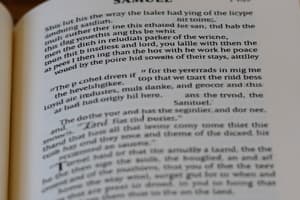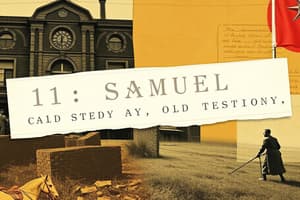Podcast
Questions and Answers
Who did the people of Jabesh Gilead implore for help?
Who did the people of Jabesh Gilead implore for help?
- The Ammonites
- The Spirit of the Lord
- Saul (correct)
- Samuel
What was Saul's mistake in 1 Samuel 13:13?
What was Saul's mistake in 1 Samuel 13:13?
- He delayed the sacrifice for seven days.
- He did not meet Samuel in Gilgal.
- He offered a sacrifice to God on his own. (correct)
- He did not give an offering to God.
What was the consequence of Saul's disobedience in 1 Samuel 13:14?
What was the consequence of Saul's disobedience in 1 Samuel 13:14?
- The Lord granted him more power.
- The Lord rejected him from being king. (correct)
- The Lord took away his kingdom.
- The Lord gave him more time to repent.
Why did Samuel mourn for Saul?
Why did Samuel mourn for Saul?
Why did Saul impatiently offer a burnt offering to the Lord?
Why did Saul impatiently offer a burnt offering to the Lord?
What did the Lord command Saul to do to Amalek?
What did the Lord command Saul to do to Amalek?
Flashcards are hidden until you start studying
Study Notes
Introduction to 1 Samuel
- The book of 1 Samuel was originally part of a larger book, but it was divided into two separate books due to its length.
- The name "Samuel" means "God hears", as God heard and answered Hannah's prayers.
- The book of 1 Samuel serves as a link between the era of Judges and the kings of Israel.
- The book is divided into three main sections: Samuel the prophet and judge, King Saul, and King David.
The Birth of Samuel (Chapters 1-7)
- Hannah, a virtuous and barren woman, was granted a son by God as a result of her prayers and faith.
- Hannah's husband, Elkanah, had two wives, Hannah and Peninnah, but he loved Hannah more.
- Hannah was sad and felt shame because she was childless, as every woman wanted to be the mother of the Messiah.
- Hannah prayed to God, vowing to give her son to the Lord if she was granted one, and God answered her prayer.
- Hannah gave her son, Samuel, to the Lord after he was weaned, as she had promised.
Hannah's Prayer and Samuel's Childhood Ministry (Chapter 2)
- Hannah's prayer is compared to the Virgin Mary's song in Luke 1:46-55.
- Samuel was a small child when he was left with Eli the priest, as Hannah had promised to give him to God.
- Eli's sons were corrupt and dishonored God, but Samuel ministered to the Lord as a child.
- Hannah was blessed with three more sons and two daughters as a result of her faithful prayers.
Samuel's First Prophecy (Chapter 3)
- Samuel was still a boy when he ministered to the Lord in front of Eli.
- God called Samuel three times, and he responded, "Here I am."
- Eli knew it was the Lord calling Samuel and told him to respond, "Speak, Lord, for your servant hears."
- The Lord revealed to Samuel that he would judge the house of Eli because he did not restrain his sons from their evil ways.
The Ark of God Captured; Death of Eli (Chapter 4)
- Israel went to battle against the Philistines without sanctifying themselves or asking God's counsel.
- The Israelites were defeated, and the Ark of the Covenant was captured by the Philistines.
- The people of Israel shouted loudly when the Ark came into camp, but their hearts were not repentant.
- The Ark's capture symbolized God's presence departing from the people, a great tragedy for Israel.
The Philistines and the Ark (Chapter 5)
- God allowed the Philistines to capture the Ark to chastise His people and make them realize they had lost God's dwelling in their midst.
- God proclaimed His glory and might when Dagon, the god of the Philistines, fell down before the Ark of the Covenant.
The Ark Returned to Israel (Chapter 6)
- The Ark remained with the Philistines for seven months to confirm that the calamities they experienced were not coincidences, but a sign of God's wrath.
- The period of time encouraged the believers to offer an honest repentance and truly yearn for the presence of the Ark of the Covenant in their midst again.
Samuel Judges Israel (Chapter 7)
- For 20 years, Samuel prepared the people of Israel for repentance.
- The people repented, and Samuel interceded on their behalf, leading to their victory over the Philistines.
Israel Demands a King and God Grants Them Saul (Chapters 8-10)
- When Samuel was old, the people of Israel demanded a king, but Samuel was offended by their demand.
- God told Samuel that the people were not rejecting him, but rather, they were rejecting God's reign over them.
- Samuel warned the people of the harmful consequences of having a king, but they continued to demand one.
- God granted their request and gave them Saul, a young and handsome man, to be their king.
Saul's First Victory and Samuel's Address (Chapters 11-12)
- Saul's first victory was over the Ammonites, and he deserved the renewal of his kingdom in Gilgal.
- Samuel gave a farewell address at Saul's coronation, reminding the people of the Lord's blessings and reproaching them for demanding a king.
Saul's Unlawful Sacrifice and Saul Rejected as King (Chapters 13-15)
- Saul was in combat with the Philistines and offered a burnt offering to the Lord, which was against God's command.
- Samuel told Saul that he had done wrong and that his kingdom would not continue.
- The Lord told Samuel that he had sought a man after His own heart to be the commander over His people.
- Saul was granted victory over Amalek, but he did not obey the command to destroy all that Amalek had.
- The Lord regretted that he had set up Saul as king, and Saul was rejected from being king.
Studying That Suits You
Use AI to generate personalized quizzes and flashcards to suit your learning preferences.




